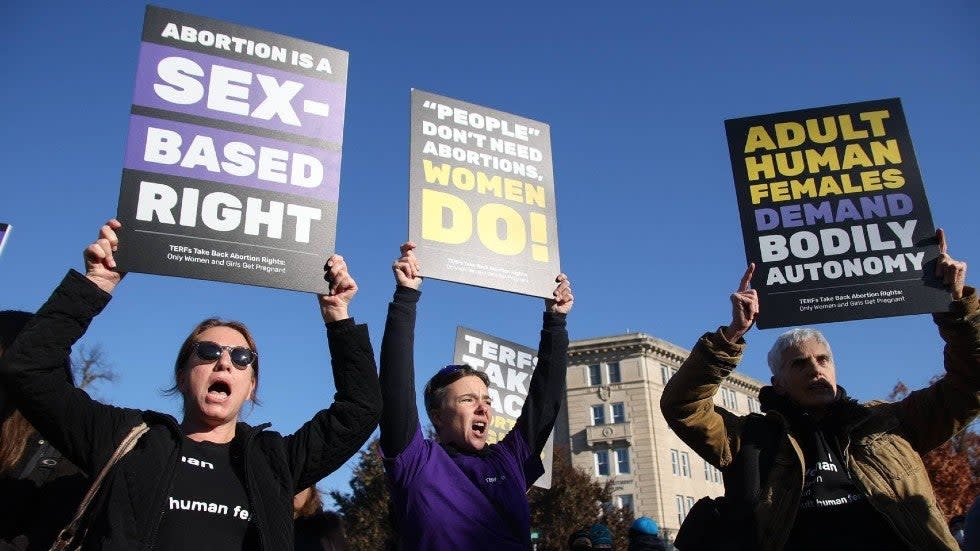The Memo: Trump's justices look set to restrict abortion

- Oops!Something went wrong.Please try again later.
- Oops!Something went wrong.Please try again later.
- Oops!Something went wrong.Please try again later.
Former President Trump's lasting influence on one of the nation's most divisive issues was revealed Wednesday, when the three justices he appointed to the Supreme Court appeared poised to restrict abortion.
The high court's total of six conservatives, half of whom are on the bench because of Trump, looked to be leaning toward upholding a Mississippi law that would ban almost all abortions after 15 weeks of pregnancy.
If they do so, they will be acting in defiance of the three liberal justices, who see the Mississippi law as an unconstitutional violation of the landmark 1973 Roe v. Wade decision - and as the thin end of a wedge that could erode abortion rights even more in the near future.
The conservatives might not even feel the need for a gradual approach.
A sweeping repudiation of Roe appeared plausible after Wednesday's arguments, as was shown by the line of questioning from the most controversial of Trump's court picks, Justice Brett Kavanaugh.
Kavanaugh - questioning Julie Rikelman, the lawyer representing the Mississippi abortion clinic that is the respondent in the case - asked why the court should not remain "scrupulously neutral" on the question of abortion.
Why should the court not "return to a position of neutrality on that contentious social issue rather than continuing to pick sides?" he wondered.
In practice, the neutrality Kavanaugh has in mind would sweep away the constitutional right to abortion established by Roe. Without that guarantee, around 20 states would be expected to restrict access to abortion or ban it outright, though the procedure would remain legal in liberal strongholds such as New York and California.
The change would be explosive. Adding further fuel to the fire, the court's ruling will likely come in June, just five months before the midterm elections.
Abortion remains a deeply polarizing topic almost half a century after Roe. In that respect, it differs from other once-divisive social issues, such as same-sex marriage and interracial marriage, where public opinion has shifted definitively.
An Economist-YouGov poll last week found 58 percent of Americans asserting abortion should be legal in all or most circumstances and 42 percent arguing it should be illegal all or most of the time.
The mere fact that a wholesale repudiation of Roe is plausible is itself testament to Trump's influence.
When the state of Mississippi was originally defending its law, which had been passed in 2018, it made a more modest case.
But the state's position expanded into a frontal challenge to Roe after the ideological complexion of the high court shifted. In 2020, Trump replaced the liberal Justice Ruth Bader Ginsburg, who had died, with Amy Coney Barrett, a conservative favorite who once signed a newspaper ad opposing "abortion on demand."
"You kind of shifted gears and talked a lot more about whether or not Roe and Casey should be overruled," Chief Justice John Roberts noted in his questioning of Mississippi Solicitor General Scott Stewart.
In addition to Roe, 1992's Planned Parenthood v. Casey established that states cannot place an "undue burden" on women seeking an abortion.
Advocates for abortion rights are horrified at the spectacle that is unfolding, even if they have feared such an outcome for several years.
Liberals trace their current predicament back at least as far as 2016, when then-Senate Majority Leader Mitch McConnell (R-Ky.) blocked President Obama's Supreme Court nominee, Merrick Garland.
McConnell's successful blockade lasted long enough to see Obama leave office, Trump be sworn in and conservative justice Neil Gorsuch be appointed. Trump added Kavanaugh in 2018 and then Barrett.
"Unfortunately there were no surprises at the Supreme Court this morning," Rakim Brooks, the president of Alliance for Justice, a progressive organization, said in a Wednesday statement. "Donald Trump and Mitch McConnell illegitimately packed the Court with radical conservative justices with demonstrated hostility to Roe V. Wade."
Gorsuch and Barrett looked to be trying, in different ways, to ease the way for an expansive change in the law.
Barrett invited the counsel for Mississippi to talk about how a change in the abortion laws need not invite challenges to other decisions that have been more widely accepted, such as those establishing access to contraception.
Gorsuch probed a different argument, implying that the standard of an "undue burden" on women seeking abortion was "unworkable" in practice
The point is an important one because the primary question regarding the Mississippi law is whether it is rendered unconstitutional by prohibiting abortions even before the fetus is viable. A fetus is generally considered to have some chance of independent life only after around 24 weeks of pregnancy.
If the court holds that the "viability standard" is no longer operative, abortion restrictions would only then be limited by the "undue burden" test. But if that, in turn, were held to be impractical, the obvious remedy would be to dismantle Roe itself.
For abortion opponents, that would be the accomplishment of a goal they have sought for decades.
But for liberals, including the diminishing number on the Supreme Court's bench, it would be a catastrophic setback.
Justice Sonia Sotomayor on Wednesday said that such a ruling would be seen as nakedly political.
"Will this institution survive the stench that this creates in the public perception that the Constitution and its reading are just political acts?" she asked.
"I don't see how it is possible," she added.
The Memo is a reported column by Niall Stanage.

